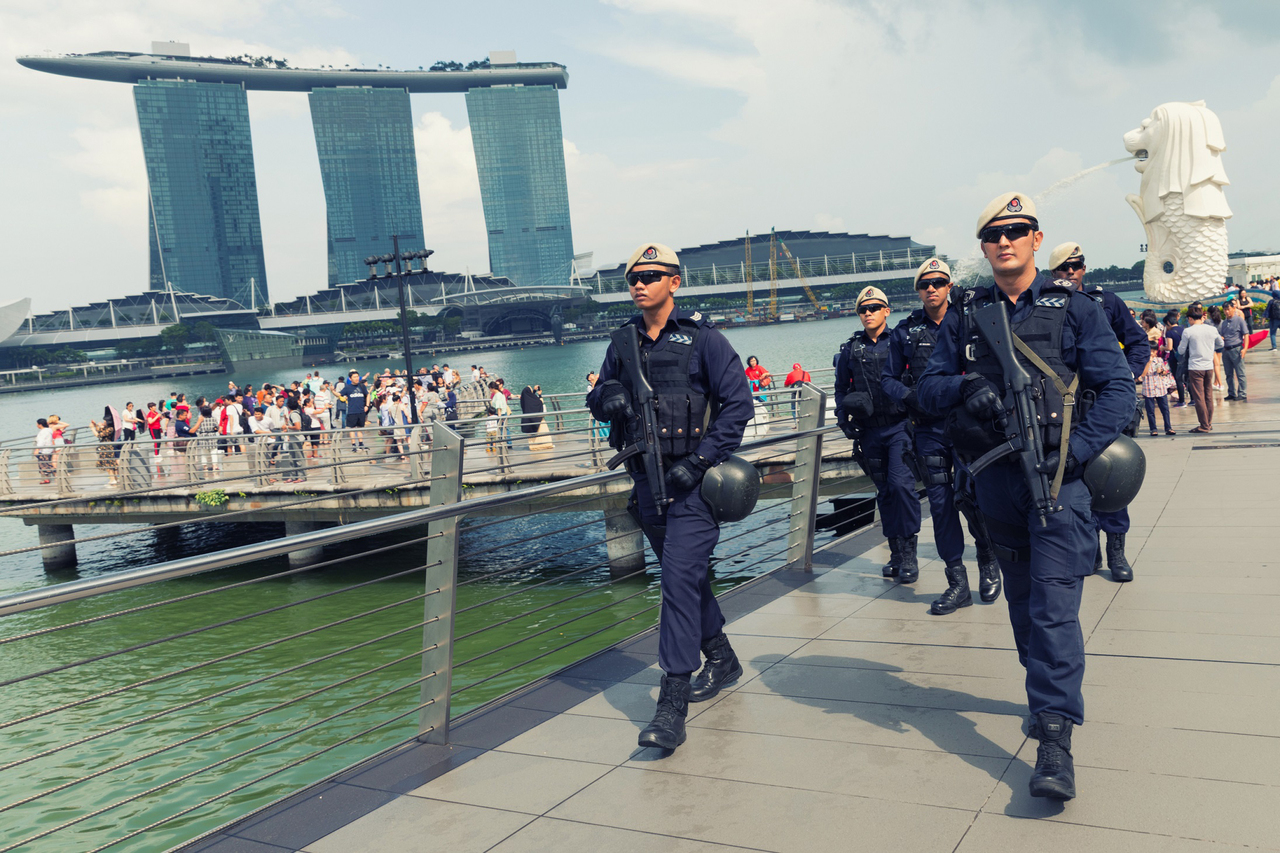Terror threat to S'pore remains high, self-radicalisation and global extremist groups are main concerns: ISD
Sign up now: Get ST's newsletters delivered to your inbox

There is currently no specific intelligence of an imminent terrorist attack on Singapore, said ISD.
PHOTO: ISD
SINGAPORE - The terrorism threat to Singapore remains high as the country continues to feature on extremist propaganda, and the resumption of international travel after Covid-19 raises concerns about how terror plots put on ice may go on.
Giving its annual terrorism threat assessment on Wednesday (July 13), the Internal Security Department (ISD) said the main concerns for Singapore are people self-radicalised online, as well as Islamist terrorist groups like the Islamic State in Iraq and Syria (ISIS), which pose a threat with their ability to inspire attacks.
There is currently no specific intelligence of an imminent terrorist attack on Singapore, said ISD, but it noted that since 2015, 45 self-radicalised individuals - comprising 33 Singaporeans and 12 foreigners - have been issued orders of detention or restriction orders under the Internal Security Act (ISA).
There have also been 13 people - three Singaporeans and 10 foreigners - convicted of terrorism financing offences.
These cases highlight the threat posed by online terrorist propaganda and self-radicalisation, said ISD in the fourth edition of its Singapore Terrorism Threat Assessment Report.
"The threat from Islamist terrorist groups and their violent ideology persists. Their virtual network of supporters continues to disseminate propaganda, raise funds and plot attacks. The spread of radical ideologies online has fuelled the self-radicalisation threat in Singapore," it said.
The latest case of self-radicalisation is a former mover at a logistics company who was detained under the ISA in April.
Radjev Lal Madan Lal, 29, was influenced by the online sermons of foreign radical preacher Imran Hosein, and practised knifing techniques as he considered travelling to take up arms. He also tried to recruit family and friends, and created a social media group to propagate his ideologies online.
His case "underscores the pervasiveness of terrorist and extremist ideologies online, including those propagated by foreign preachers and ideologues", said ISD, stressing the importance of a zero-tolerance approach towards extremist rhetoric here.
On the international front, the department said ISIS continues to pose a significant security threat. The terror group has not stopped its attacks despite losing its hold on territory in Syria and Iraq about four years ago, and recently claimed credit for attacks in Syria, Egypt and Israel.
ISIS announced a new leader a month after its leader Abu Ibrahim al-Hashimi al-Qurayshi died during a raid by US forces in February.
This prompt appointment reflects the group's "deep leadership bench and operational resilience", said ISD. It added that, outside of conflict zones, ISIS continues to build its global footprint through its affiliates across the Middle East, Africa and Asia.
Within South-east Asia, such affiliates are the primary driver of terrorism, and pose the most immediate threat through their ability to mount ISIS-inspired attacks, said the department.
While the number and scale of ISIS-linked or inspired terror plots in the region have declined due to strong counter-terrorism measures and Covid-19 travel curbs, ISD warned that this lull is likely to be temporary as border restrictions are lifted.
More than 1,000 South-east Asians have travelled to the Syria/Iraq conflict zone since the mid-2010s, ISD noted. At least 600 remain in Syria, with a significant number of them being women and children in detention camps.
"Despite the distance, these individuals pose a security concern to our region. Battle-hardened fighters could facilitate and direct attacks from abroad," said ISD.

It added that these camps act as incubators for the next generation of militants who become indoctrinated in violent ideology. Female supporters from there have reportedly been actively promoting ISIS propaganda on social media and radicalising others back home.
Flagging the thriving pro-ISIS ecosystem on social media, ISD said autonomous media groups and ISIS supporters are engaging in "cyber jihad" by circulating official ISIS materials alongside self-produced propaganda.
"This facilitates the radicalisation and recruitment of a virtual 'caliphate of believers' who remain loyal to ISIS."
The report highlighted the emerging threat of far-right extremism, and also how regional terror cell Jemaah Islamiah may revive ties with extremist network Al-Qaeda - the architects of global terror attacks, including the Sept 11, 2001 attacks in the United States.
ISD said that while the Government will continue to step up its counter-terrorism capabilities and keep Singapore safe, members of the public play a critical role in countering such threats through their preparedness and vigilance.
The anti-terrorism movement SGSecure, which was launched in 2016, has helped to mobilise the community in the fight against terror, it said, underscoring how the first response of individuals at the scene of a terrorist attack is crucial.
After an attack, the collective response by the community to denounce the act and support those affected would be fundamental to Singapore's recovery, ISD added.
"Our strongest defence is our collective vigilance, preparedness, resilience and unity, along with a zero-tolerance approach to those who seek to conduct or finance terrorist acts, or propagate extremist rhetoric to foment divisions within our community."
The Singapore Terrorism Threat Assessment Report is aimed at alerting Singaporeans to the security environment here and regionally. It was first published in June 2017, and was initially released once every two years but is now released annually.
Two convicted of terrorism funding in the past year
Singapore takes a firm stance against terrorism financing-related activities and in the past year, two individuals have been convicted of such offences.
The Internal Security Department (ISD) said on Wednesday that this brings the total number of people who have been convicted of terrorism financing to 13, since laws criminalising it were introduced.
The Terrorism (Suppression of Financing) Act (TSOFA), which criminalises the act of providing money for terrorist purposes regardless of the amount involved, was introduced in 2002.
In the first of the two recent cases, Singaporean businessman Mohamed Kazali Salleh had given a Malaysian man over $1,000 in 2013 and 2014 to facilitate the latter’s journey to Syria to become a fighter for ISIS.
In September 2021, Kazali was sentenced to three years and 10 months’ imprisonment for his terrorism financing offences.
In the second case, Bangladeshi Ahmed Faysal had made fund transfers between February and October 2020, totalling about $900 via online platforms, which he knew would benefit the terrorist entity Hayat Tahrir Al-Sham in Syria.
He was sentenced to two years and eight months’ jail for his terrorism financing offences in February this year.
ISD said that of the 13 people who have been convicted under TSOFA since 2002, three of them were Singaporeans and 10 were foreigners.
The Internal Security Department (ISD) said on Wednesday that this brings the total number of people who have been convicted of terrorism financing to 13, since laws criminalising it were introduced.
The Terrorism (Suppression of Financing) Act (TSOFA), which criminalises the act of providing money for terrorist purposes regardless of the amount involved, was introduced in 2002.
In the first of the two recent cases, Singaporean businessman Mohamed Kazali Salleh had given a Malaysian man over $1,000 in 2013 and 2014 to facilitate the latter’s journey to Syria to become a fighter for ISIS.
In September 2021, Kazali was sentenced to three years and 10 months’ imprisonment for his terrorism financing offences.
In the second case, Bangladeshi Ahmed Faysal had made fund transfers between February and October 2020, totalling about $900 via online platforms, which he knew would benefit the terrorist entity Hayat Tahrir Al-Sham in Syria.
He was sentenced to two years and eight months’ jail for his terrorism financing offences in February this year.
ISD said that of the 13 people who have been convicted under TSOFA since 2002, three of them were Singaporeans and 10 were foreigners.


